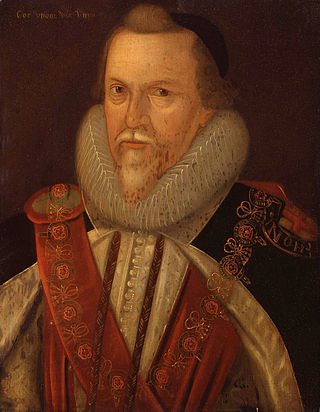Related Research Articles

George Abbot was an English divine who was Archbishop of Canterbury from 1611 to 1633. He also served as the fourth Chancellor of the University of Dublin, from 1612 to 1633.

Robert Cecil, 1st Earl of Salisbury, was an English statesman noted for his direction of the government during the Union of the Crowns, as Tudor England gave way to Stuart rule (1603). Lord Salisbury served as the Secretary of State of England (1596–1612) and Lord High Treasurer (1608–1612), succeeding his father as Queen Elizabeth I's Lord Privy Seal and remaining in power during the first nine years of King James I's reign until his own death.

Salisbury is a cathedral city in Wiltshire, England with a population of 41,820, at the confluence of the rivers Avon, Nadder and Bourne. The city is approximately 20 miles from Southampton and 30 miles from Bath.

Earl of Kimberley, of Kimberley in the County of Norfolk, is a title in the Peerage of the United Kingdom. It was created in 1866 for the prominent Liberal politician John Wodehouse, 3rd Baron Wodehouse. During his long political career, he notably held office as Lord Lieutenant of Ireland, Secretary of State for the Colonies, Secretary of State for India and Secretary of State for Foreign Affairs. He was succeeded by his son, the second Earl. At first a Liberal like his father, he later joined the Labour Party, becoming the first Labour member of the House of Lords. His eldest son, the third Earl, represented Norfolk Mid in the House of Commons as a Liberal. Since 2002, the titles are held by the latter's grandson, the fifth Earl.

Thomas Cecil, 1st Earl of Exeter, KG, known as Lord Burghley from 1598 to 1605, was an English politician, courtier and soldier.
Events from the year 1677 in England.
Sir Joseph Wagstaffe was a Royalist officer during the English Civil War and one of the leaders in the Penruddock uprising of 1655.

Sir John Herbert was a Welsh lawyer, diplomat and politician who sat in the House of Commons at various times between 1586 and 1611. He was Secretary of State under Elizabeth I and James I.
Richard Hardinge was Groom to the Bedchamber to the then Prince of Wales.
John Bayley may refer to:

John Philip Glen is a British politician and former management consultant serving as Chief Secretary to the Treasury since October 2022 and Member of Parliament (MP) for Salisbury in Wiltshire since 2010. Glen is a member of the Conservative Party. Formerly Parliamentary Under-Secretary of State for Arts, Heritage and Tourism at the Department for Digital, Culture, Media and Sport, Glen served as Economic Secretary to the Treasury and City Minister from January 2018 to July 2022.
Sir Lawrence Hyde II was an English lawyer who was Attorney-general to the consort of King James I, Anne of Denmark. He sat in the House of Commons at various times between the years 1584 and 1611.

Thomas Somerset, 1st Viscount Somerset (1579–1651) was an English politician who sat in the House of Commons between 1601 and 1611. He was raised to the Peerage of Ireland in 1626.
Giles Tooker was an English lawyer and politician who sat in the House of Commons between 1601 and 1614.
Sir Richard Norton, 1st Baronet was an English politician who sat in the House of Commons from 1621 to 1622. He supported the Royalist cause in the English Civil War.
Edward Popham (1581–1641) was an English Member of Parliament for Bridgewater in 1621, 1624, 1625 and 1626, and was also Sheriff of Somerset for the year 1622/23.
Robert Crosse, was an English politician.
Sir William Cornwallis of Brome was an English courtier and politician.

The 1st Parliament of King James I was summoned by King James I on 31 January 1604 and assembled on 19 March following. It was known as the Blessed Parliament and took place in five sessions, interrupted by Holy Days and the Gunpowder Plot. The speaker was Edward Phelips, the Member of Parliament for Somerset.